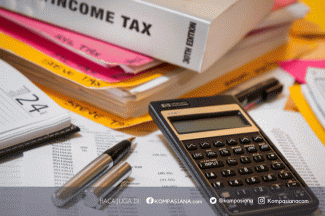by Niken Candra
Economy growth is one of the indicators to determine the economic progress of a country. Each country has a different rate of economic growth depending on the conditions of the country. The rate of economic growth is measured by the country's national income, this national income in aggregate consists of the level of consumption, the level of investment, the level of government spending and the conditions of international trade (exports and imports). However, this measurement still has shortcomings that in real terms do not reflect the real economic conditions and are measured in a biased or under-estimate. The global issue that has occurred in more than a decade in every country in the world is that there are still economic activities that are not measured in real terms, including the activities of the underground economy/black economy/unofficial economy. economy/black economy/unofficial economy/Shadow economy (Schneider and Hametner, 2014). The activities of the underground economy in every country in the world (developed and developing countries) are inseparable. This economic activity occurs legally or illegally which is not measured in the national income/ GDP measurement method.
The underground economy is common in every country regardless of income level and sector. It comprises a range of activities from unreported economic activity by paid domestic workers (maids) to registered entrepreneurs who underestimate their production. The prevalence of the shadow economy is associated with the coverage of national accounts and the nature of some activities. National accounts cover only a limited range of economic activities as some economic activities are deliberately hidden by businesses to avoid taxes, while others are missed because the survey framework excludes small or very new businesses. Therefore some economic activities will remain completely unrecorded. This is what causes the phenomenon of the underground economy.
Currently the Indonesian economy is still burdened by unrecorded economic activity. Unrecorded economic activity has reached around 8.3-10% of gross domestic product (GDP). If the GDP in 2018 was recorded at Rp 14,837 trillion, the unreported economy reached more than Rp 1,400 trillion. The increasing activities of the underground economy have resulted in economic performance that has been measured through the amount of Gross Domestic Product (GDP) to be biased or under estimate.
On the other hand, the development of underground economy activities also creates losses for the state through the amount of lost tax potential. Underground economy activities generally escape the supervision of the tax authorities, thus eliminating the obligation to pay taxes from the perpetrators of the underground economy which causes losses to the state. Underground economy includes both illegal and legal activities. Illegal means against the law, such as illegal fishing, illegal mining, illegal logging, smuggling, and other activities. While legal means that the activity is not against the applicable law but the income earned from the activity is not reported to government institutions, such as the Directorate General of Taxes.
The state is also a factor that influences the size of the shadow economy primarily through its ability to deter and suppress tax evasion and from its level of revenue power. More specifically, a country's ability to reduce tax evasion depends on the effectiveness of the tax service organization, the structure of the existing tax system, and the level of corporate accounting organization. The risk of being caught and punished is one of the main deterrents for tax evaders. At the same time, individuals' tax morality is not only related to the existing level of social development, but also to the perception they have of the State, although the two factors are not unrelated. If they believe that the State is an ineffective organization that does not aim to increase prosperity, they may easily turn to the underground economy. On the other hand, countries with high levels of corruption, especially in the public sector, also tend to have an extensive hidden economy, as corruption in the public sector increases the opportunities given to turn to the shadow economy. In the end, sometimes a country, for various reasons, loosens controls so as to strengthen activities in the shadow economy.
Reference :
Samuda, S. A. (2016, juli). UNDERGROUND ECONOMY IN INDONESIA. Retrieved from bmeb-bi.org:https://www.
bmeb-bi.org/index.php/BEMP/article/download/599/860
Aragie, E. A. (2020, Juli). The Underground Economy and Tax Evasion in Ethiopia: Implications for Tax Policy.



